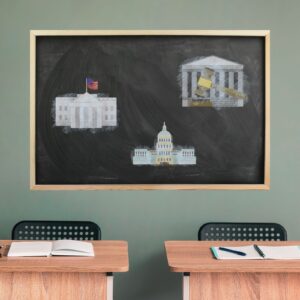In an increasingly global society, a nation’s need for responsive foreign policy is critical to future success and stability. Amidst the United States’ increasing focus on Asia and the Middle East, the nation’s Latin American foreign policy has not received the focus it enjoyed in the past several decades. Historically, the relationship between the United States and Latin America has been both complex and tentative. U.S. – Latin American foreign relations saw highs and lows in social movements and political upheavals of the 1960s, economic turmoil of the 1970s, Chilean and Argentinian public outcry during the 1980s, and trade agreements of the 1990s, to name a few. As Latin American countries continue to grow, evolve, and thrive, so too should the U.S.’s foreign policy regarding each of these nations. More importantly, the notion of creating “blanket” polices toward Latin America is antiquated and incorrectly paints a monochrome picture over nations whose cultural heritages are as colorful as they are rich. In this time when the vital resources of individuals, goods, and services are crossing borders, informed policymaking with a dedicated focus on public administration education should as well.
As in any dyadic relationship, efforts to make public policy education its most applicable must be undertaken from both sides. Currently, there is a strong push from the higher education sector for international study abroad programs both within and outside the United States. With over 900,000 international students currently studying in the U.S.,[i] a record high, and over 300,000 American students studying abroad,[ii] the overarching desire for multicultural education is apparent. The Institute of International Education’s Open Doors Report also mentions the increasing popularity of “less traditional” study abroad locations, many in Latin American countries. Though the fact that learning abroad is not only widely accepted, but growing, is promising indeed. What the facts do not bring to light is the nature of the curriculum of these studies, or how deeply the abroad classes delve into the cultural nuances of policy. Furthermore, a general sentiment in the foreign policy arena contends that U.S. engagement with Latin America has declined in the past ten years[iii]. The United States’ tendency to get involved in policy within the region has dropped, and U.S. attention to the entirety of Latin America has largely shifted toward the region’s major economic players including Brazil, Central America, and Mexico.[iv] This shifting focus away from smaller Latin American countries results in the creation of domestic institutions to resolve some crises internally. Though some may argue this lack of U.S. involvement in these crises’ resolutions is not inherently negative in terms of foreign policy, the creation of domestic institutions to solve foreign policy issues removes opportunities for public policy students to learn from other nations directly. This applies not only to institutions created in Latin American countries removing opportunities for U.S. students’ learning, but the opposite as well. One unifying practice in the field of foreign policy is to identify distinct channels promoting cooperative relationships between countries. Some argue these channels may take the shape of political policy or economic reforms;[v] however, the often overlooked—yet critically imperative—notion of a policy encouraging the experience of international multi-cultural education experience needs to receive increased attention as a solution to the U.S. Latin American foreign policy concerns.
An interview with Peter Hakim, President Emeritus and Senior Fellow of the Inter-American Dialogue, shed additional light on the topic of education’s role in public policy and U.S. – Latin American foreign relations. Hakim mentions that the study of individual nations’ foreign policies is a much more fruitful avenue for students and future policymakers than continuing down a ‘blanket’-policy path. He comments, “[The U.S.’s] relations with Brazil are so different than what they are with Guatemala, our relations with Mexico and Paraguay have nothing in common—how can we talk about a Latin American policy?” He goes on to tout the benefits, for students seeking careers in foreign policy, of gaining a broad knowledge base in their educational pursuits, rather than focusing solely on policy coursework. Hakim remarks, “It seems to me that there ought to be a better way for people to both study [a specific professional concentration] and Latin American foreign policy. One does not have to say we have too few [tradespeople or specialists], but rather we also have too few people that learn about what’s going on in other countries, [these students] would be better off with a broader education…” The thought that policy studies should be assumptive of a practicable comprehensive solution is antiquated, Hakim’s suggestion that a broader knowledge base in conjunction with a culturally sensitive policy education is exactly the shift that should take place. Education concerning public administration and Latin American policy depends primarily on the understanding of context. A location’s culture, socioeconomics, and politics fundamentally shape the field of the public policy that operates there. Regionally-specific factors shape the policies that policy-makers practice and the policy makers’ educational environments must be sensitive to that fact. The current state of public policy education toward Latin American policy is varied, and higher education experts indicate the design of many public administration programs are not as applicable as they should be.[vi][vii] Most case studies and literature used in public administration courses are derived from American and European models which lack the particular context needed to effect meaningful change in policy creation. Furthermore, even the relatively small number of new Latin American higher education institutions formed to study policy are not presenting coursework through the lenses of the nations’ most prevalent public sector roadblocks: corruption, a lack of transparency, and accountability.[viii]
In order to prepare policy makers for challenges in Latin American context, professionals in higher education must combine forces with those in foreign policy to craft long-term frameworks which result in a broad understanding of policy issues. Changes need to occur in American as well as Latin American higher education markets. Alterations to the educational framework could include experiential learning in Latin American programs: in markets where there is no formal nonprofit management education but nonprofit organizations are present, these entities should be encouraged to interact with students, share insights, create internship opportunities, and then propagate the knowledge gained from those experiences. Changes should also involve deep evaluations of curriculum: examine the coursework of Latin American public administration programs and of American programs’ concentrations to ascertain if these curricula reflect values known to promote justice, transparency, and good governance. These changes could also include the assistance of researchers and industry professionals, as well as scholars, students, community members, and cultural institutions’ leaders to craft programs—in both educational markets—that reflect the challenges presented by varying locales. Consequential, long-lasting, and positive policies are only proposed by those policy makers whose educations enable them to understand contextual nuances in the cultures of Latin America. A broad blanket of policies designed to effect the entirety of the region is not the most appropriate measure, and until the education of foreign policy is as nuanced as the nations themselves, policy makers will continue to run the risk of constructing an over-generalized approach.
As a generally growing practice of multiculturalism is recognized across all sectors, U.S. colleges and universities offering coursework in public policy must not only acknowledge the concept of context-specific education practices, but also embrace it. By collaborating with Latin American institutions, designing domestic programs that include experiential learning components, and simply working to create additional opportunities for students in both regions to experience each other’s cultures through educational exchanges, a more meaningful dialogue will be created. This dialogue will positively affect the ability of future policy makers to implement meaningful public service change across the globe.
[i] “Institute of International Education”, Open Doors Report 2015, Online PDF, 2015.
[ii] Ibid.
[iii] “Transforming U.S.-Latin American Relations”, Harvard Review of Latin America, 2015.
[iv] “European and U.S. Policies Converge in Latin America”, The Dialogue, 2012.
[v] “U.S. Latin American Relations: A New Direction for A New Reality”, Council on Foreign Relations, 2008.
[vi] “Schwartz & Teichler. The Institutional Basis of Higher Education Research”, Online Book, 2000, (pp. 117-135).
[vii] “Research Universities in Latin America”, John Hopkins University Press, Online PDF, 2012.
[viii] “Higher Education in Latin America: The International Dimension”, The World Bank, Online PDF, 2005.





